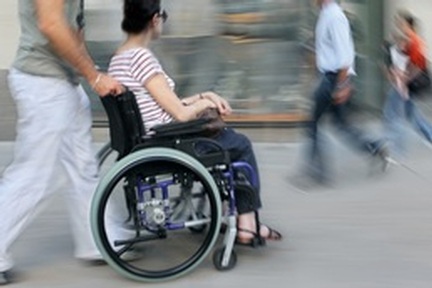Government praises disabled Access to Work scheme just months after capping funding
The Government has praised the Access to Work scheme which helps disabled workers with travel to work, purchase of specialist equipment and support workers, just months after it announced plans to cap the awards it gives out.

The Department for Work and Pensions (DWP) claims record numbers of people with learning disabilities and mental health conditions are being helped into work by the Access to Work scheme.
New figures show more than 2,000 people with a learning disability were helped by the initiative in the year to 31 March 2015 with more new awards than ever before, taking the total number of disabled people supported by the scheme to 36,760.
The number of people with mental health conditions using the scheme – which includes the recently-established Mental Health Support Service in Access to Work – has continued to rise and now stands at more than 1,600.
Minister for Disabled People, Justin Tomlinson, said: “It’s great news that more people are taking advantage of the support on offer through the ‘Access to Work’ scheme. These figures show we are making real progress in supporting disabled people to find and stay in employment – delivering on our commitment to halve the disability employment gap.
“With almost a quarter of a million more disabled people in work compared to last year it’s clear employers are waking up to the talent that is out there.”
Access to Work is a Government scheme which was introduced in 1994, bringing together a range of services available to people with disabilities and their employers. The support includes communicators for people who are deaf or have a hearing impairment, a part-time reader or assistance at work for a blind worker, equipment or adaptations to existing equipment to suit individual needs plus adaptations to a car, or taxi fares or other transport costs for someone who cannot use public transport to get to work.
The Government has said that to build on the latest growth in user numbers, it will expand the existing Mental Health/Fluctuating Conditions Team of Access to Work advisers into a Hidden Impairments Specialist Team. This will target support at people with mental health conditions and learning disabilities as well as dyslexia, autism and other less visible disabilities.
Since April 2007, Access to Work has helped nearly 124,000 disabled people into employment.
News of the rise in people using the Access to Work scheme comes just months after the Government announced it is capping the amount a person can claim to one-and-a-half times the average salary, which at current levels would mean no-one could claim more than £40,800 per year. It also revealed it will be introducing Personal Budgets for the Access to Work scheme.
When the measures were announced back in March this year, Liz Sayce, chief executive of Disability Rights UK said: “The change to personal budgets is a very welcome step. It will mean increased flexibility and less bureaucracy for disabled people, allowing them to concentrate on their jobs instead of filling out endless forms.
“Disabled people are more likely to be self-employed than non-disabled people, so additional help for people who work for themselves is also welcome.
“But why a sting in the tail in the form of a cap on awards? Even now, with no cap, the scheme makes the Government money. For every £1 spent on Access to Work, £1.48 comes back to the Exchequer in tax, national insurance or savings to the benefits bill.
“This short sighted change will mean that employers may avoid recruiting the best people for the job, and that's a waste of talent, resources and energy.”
The new cap is likely to hit Deaf users of British Sign Language (BSL) hardest, with about four-fifths of the highest value awards paying for BSL services.
Latest News
 29-Jul-24
Dementia Bus gives carehome.co.uk staff insight into life with dementia
29-Jul-24
Dementia Bus gives carehome.co.uk staff insight into life with dementia
 27-Jul-23
UK's top home care agencies in 2023 revealed
27-Jul-23
UK's top home care agencies in 2023 revealed
 30-Nov-22
A quarter of older people keep their falls secret from family
30-Nov-22
A quarter of older people keep their falls secret from family
 29-Nov-22
'Covid-19 has not gone away' say terminally ill
29-Nov-22
'Covid-19 has not gone away' say terminally ill
 28-Nov-22
IT consultant who received poor care opens 'compassionate' home care business
28-Nov-22
IT consultant who received poor care opens 'compassionate' home care business